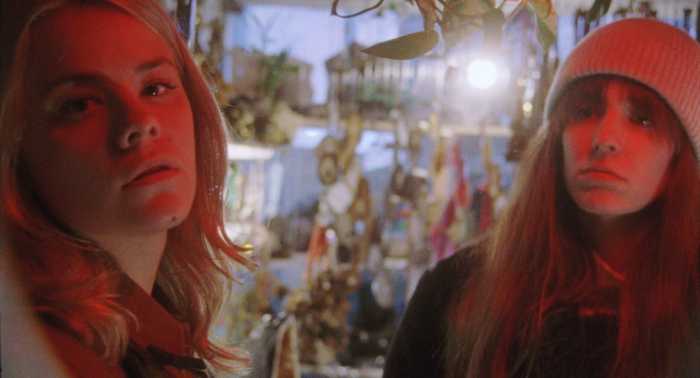Although the Museum of the Moving Image’s “First Look” series is now in its 11th year, the 2022 lineup carries a special topicality. It includes two films by the best-known contemporary Ukrainian documentarian, Sergei Loznitsa: “Babi Yar. Context,” and “Mr. Landbergis.” There is also “Reflection,” a dystopian war movie by Ukrainian director Valentyn Vasyanovych.
Russia itself is represented with “Petrov’s Flu,” directed by Kirill Serebrennikov (who was convicted last year in a politically motivated prosecution). The adage that all art is political rings even truer with this year’s lineup. But equally subversive, in a subtler way, is the festival’s engagement with all kinds of filmmaking — indeed, all kinds of image making, considering that it includes a video installation and a performance in virtual reality.
Its selection ranges from movies running three hours or more (“Mr. Landbergis,” the Chinese “A New Old Play”) to a wide selection of shorts.
While festivals often deploy shorts as filler, Radu Jude’s 22-minute “Semiotic Plastic” is as dense, carefully designed (both in image and sound) and thoughtful as most features (including his own “Bad Luck Banging, or Loony Porn,” released last fall). Inspired by Flaubert, Baudelaire, and Chekhov’s writing on clichés, he decided that dolls and other toys are the visual equivalent.
“Semiotic Plastic” runs through the entire life cycle of a person and the human race itself, from birth to an apocalyptic final shot where a robot beeps and dances in place, surrounded by dinosaurs and saying “hello” without a person in sight. Jude fulfilled the doll manufacturers’ idea of play, but he takes that concept into very adult territory. His dolls have gay, lesbian, and heterosexual sex. Putting Barbie’s mouth on Ken’s crotch, much less arranging butch male dolls to have anal sex with each other, carries a transgressive charge. This horniness is a carry-over from “Bad Luck Banging, or Loony Porn,” which began with an actual porn short. But Jude’s vision is much darker. Barbie sees an unhoused man, passed out on the street with a bottle in his hand, as ambulance sirens race on the soundtrack. He eventually re-stages the Iraq War. This film has no dialogue, but its use of sound effects is eloquent. It was designed to be seen several times, with the viewer paying close attention. Granted, there’s a degree of adolescent sarcasm in “Semiotic Plastic,” but it’s brilliantly aimed and genuinely witty.
Gay Taiwanese director Ming-liang Tsai’s short “The Night” is much more elliptical and allusive than “Semiotic Plastic.” It was shot in Hong Kong’s Causeway Bay three years ago. Tsai deploys his trademark long takes and long shots. (Although without his muse Lee Kang-sheng, it suggests a continuation of his “Walker” series.) For more than five minutes, “The Night” shows a group of people waiting for a bus that never comes. But Tsai’s night seems oddly detached, even de-populated. Despite his framing’s beauty, the pervasive loneliness and alienation underpinning most of his films still comes through. “The Night” eventually forces emotion onto this material by playing a mournful song with the opening line “The beautiful night is slipping away.” Tsai films the debris of posters fading from walls; the final shot shows a wall splattered like an Abstract Expressionist painting. Hong Kong’s political protests and increasing dominance by mainland China are never mentioned explicitly, but the mood of loss hints towards them.
Nicolaas Schmidt’s “First Time: The Time For All But Sunset (Violet)” is a 50-minute experimental film shot on one of the trains that rides in a circle around Hamburg, Germany. Most of it consists of a very long single take. But Schmidt kicks it off with a montage of images of heterosexual romance taken from Coca-Cola commercials, set to a bombastic pop song. The homoerotic attraction between two young men on the train suggests the vulnerability and tentativeness of unmediated desire. (To continue the film’s political undercurrent, one man sits near a poster which reads, translated from German to English, “the manifestation of capitalism in our loved ones is sadness.”) They look at each other, then glance away. Meanwhile, the passage of other people on the train and the glimpses of Hamburg through the window provide visual variety. This all threatens to turn into a narrative but resists that impulse. Shot just before sunset, “First Time” uses color and light to great effect, going from abstract flashing orange images to the sun’s blinding glare to complete darkness in a few minutes. (It alludes to the heterosexual love story of Richard Linklater’s “Before” trilogy.) While minimalist, “First Time” is lively, avoiding slow cinema clichés in favor of a lighter approach.
Daniela Seggiaro’s “Husek” addresses a subject generally missing from the Argentine films that play New York: the country’s indigenous people. Set amidst the land of the Wichi (50,000 of whom live in Argentina), it begins with Valentino (Juan Rivero) and his grandson Leonel (Leonel Gutierrez) gathering wild honey. This contrasts with the later scene where Leonel reads off the list of ingredients from a sugary, chemical-laden orange-flavored drink. Ana (Verónica Gerez), a lesbian architect, has come to design a project in the Gran Chaco region. It faces opposition from the locals, including Valentino, who recognize they’re being forced off their ancestral land. Ana comes to realize her neo-colonial position and grow uncomfortable with it. This subject has come up in a surprising variety of films, including the Lesotho-set “This Is Not a Burial, It’s a Resurrection. ” The element of supernatural forces acting to protect the Wichi leads to a few notable scenes, especially one where a real estate video glitches out into broken, distorted colors. But Seggiaro’s work feels cautious and hesitant. As a white director making a film about indigenous people’s struggles, she has very good reason to tread lightly, but “Husek” suffers from an excess of politeness.

















